Does a Harassment Order Go on Your Record?
To answer the question, does a harassment order appear on your record? Most harassment orders are filed in civil court and this is unlikely to appear on an individual’s record.
 Written by Background Check Repair
Written by Background Check Repair
Criminal Records | April 29, 2024
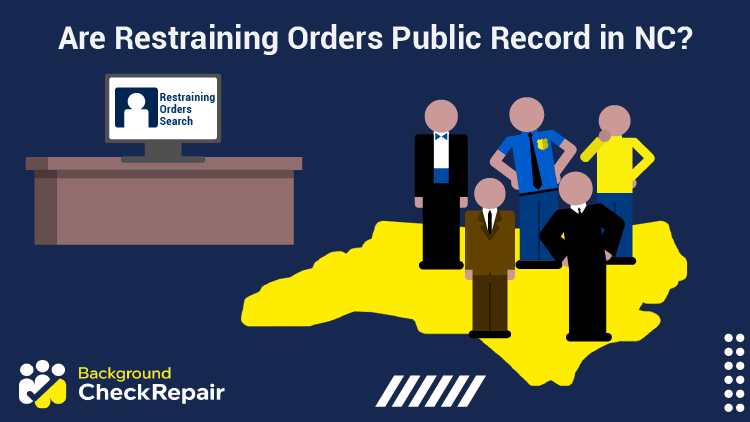
Table of Contents
When facing a potential restraining order, many people ask are restraining orders public record in NC? What are the public record lookup laws in North Carolina?
Not surprising, North Carolina is like many other states regarding what court information is considered public record. Most restraining orders are filed in civil court, and most civil court cases will not be a part of the public record.
Therefore, individuals who have had a restraining order filed against them will likely not see this on their record. However, that’s not the end of the story.
When wondering, are restraining orders public records in NC, know that any orders that are connected to criminal activity or those that are filed in criminal court (such as stalking that involves a stranger), will show up on a background check.
Here’s how the law in North Carolina works.
When it comes to the issue of, are restraining orders public record in NC, the issue is somewhat complicated. The Freedom of Information Act is the main cause of the confusion since there are so many misconceptions about the way this law works and where it applies.1
The FOIA was adopted in order to increase transparency between citizens and government agencies. This law requires that all government entities make all their records publicly available, which would apply to both federal and state courts.
Technically, under the FOIA, all court records should be publicly available. However, there are numerous exceptions to the FOIA, that make plenty of public records, including court records, not accessible to the public.
When it comes to court records and the FOIA, the issue of court records being public has to do with the public’s right to know about cases that could affect them.
When it comes to criminal court, it is quite clear how this information is relevant to the public: criminal cases are directly related to the safety of individuals in the local community, therefore individuals have a right to know who was convicted and charged with what crimes.
However, with civil court cases, the information is usually of little relevance to the public. With civil and family court records containing so much information that is of little to no consequence to the public, many judges will choose to seal this information.
This is mainly for privacy reasons and because the potential harm that this information being public could do to those involved outweighs the benefit of the information being public.
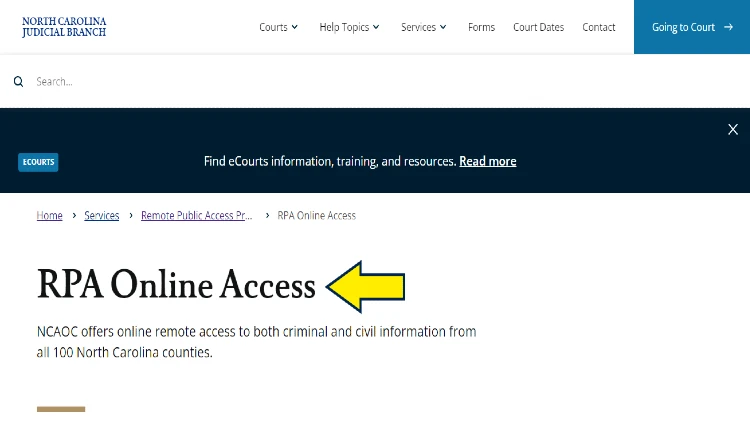
The North Carolina Judicial Branch provides an online portal for users to search court records, both criminal and civil.
This is where restraining orders come in. Since restraining orders are usually filed in civil or family courts, the records of the orders being filed are usually not public information since all of the records relating to the case will be sealed upon filing.
The individuals involved in the family court case may access the information, but not the general public.
Basically, when it comes to, are restraining orders public record in NC, although the answer is yes, the ability to actually obtain these records is a different story.
However, this does not mean that all restraining order records will not be available to the public. Although the majority of these orders are filed in civil and family courts, there are also plenty of restraining orders filed in criminal court as the result of criminal charges.
Most often these will be related to criminal charges like domestic violence or stalking. Regardless of the associated criminal charge, criminal records are almost always available to the public, meaning that both the records of the criminal charges and the related restraining orders will be part of the public record.
In regard to the question of, does a restraining order appear on your record, assuming the order was filed in a criminal court and not in a civil or family court then the answer is yes.
When people talk about an individual’s record or an individual’s criminal record, they are generally referring to whether or not there are any criminal court records that involve the individual.
Anything that is filed in a criminal court that involves the individual, such as criminal charges, restraining orders, or conviction information will be a part of the individual’s record. How long this information will remain on the record and whether or not it is possible to have the information removed will depend on state law and a variety of other factors.
Since it can be fairly confusing to understand the different laws and the way courts keep various records, one of the best things that individuals can do to be certain is to perform a restraining order background check on themselves.
Background checks are easier and faster to perform than ever, and it allows individuals to see exactly what is on their check as well as fix any possible mistakes that may exist. Individuals have a few options available to perform a background check on themselves, each with its own set of benefits and drawbacks.
The easiest and quickest method to perform a background check on yourself is to use the search bar at the top of this page by entering your name.
Doing so will allow individuals to perform public records search on themselves, which is similar to what is done during a pre-employment background check, and will let individuals know if there is any information relating to a restraining order on their record.
Besides the search bar at the top, individuals can also use a private background check service to perform the check, but individuals should know that these checks will usually require that individuals purchase a monthly subscription service to perform the check. Although there are those that offer free trials.
Finally, the most intensive background check that is available to the general public is the FBI identity history summary check.2
The FBI background check is a federal background check that uses the individual’s fingerprints, rather than just their name. This is likely the best and most thorough check that an individual can purchase at this time.
When it comes to how long a restraining order stays on your record assuming the order was filed in criminal court and is actually on the record, then individuals should next look to state laws. The only federal law that determines how long criminal history information will remain on someone’s record, specifically how long it can appear on a background check, is the FCRA.3
The FCRA does not have any limits on how far back a background check can look for conviction information. However, several states have adopted their own laws that prevent background checks from going back further than 7-10 years.
Unfortunately, there are only a handful of 7 or 10-year background check and in North Carolina, criminal information such as restraining orders will remain on an individual’s record forever.
Many people will also be concerned with how a temporary restraining order will affect them and will be wondering, does a temporary restraining order remain on your record, fortunately this is unlikely.
Since almost all temporary restraining orders or TROs are filed in civil court, they will likely not be present on an individual’s record.
Not only are the records usually sealed, but most background checks only focus on criminal history information and will simply not check civil court records at all.
The North Carolina public records law is fairly standard and has very little that separates it from the FOIA, or other state record laws.4 North Carolina considers all government records to be public and anyone can file a records request.
However, there are numerous exceptions regarding confidential information and other sensitive materials, which is standard for open record laws across the country.
Individuals interested in reading the exact text will need to look at the North Carolina records law G.S. 132-1.5 The NC general assembly is where individuals can find the exact documents pertaining to the open records law in the state.
There is also information available through the website of the North Carolina judicial branch that outlines some basic questions, such as the cost of records, how to request them and what to expect from the entire process.6
There are several North Carolina Public records law exemptions that individuals should be aware of before they waste their time requesting records that are not available.7
Most notably, there are records that are deemed confidential, usually because they deal with issues of national security, and there are records that are considered non-public, which an agency can choose to publish if they wish.
Many people will be hoping for a way to find North Carolina public records online but might not know where to look or what records will be available. Luckily, there are tons of public records in North Carolina that are available for individuals to search out and request online.
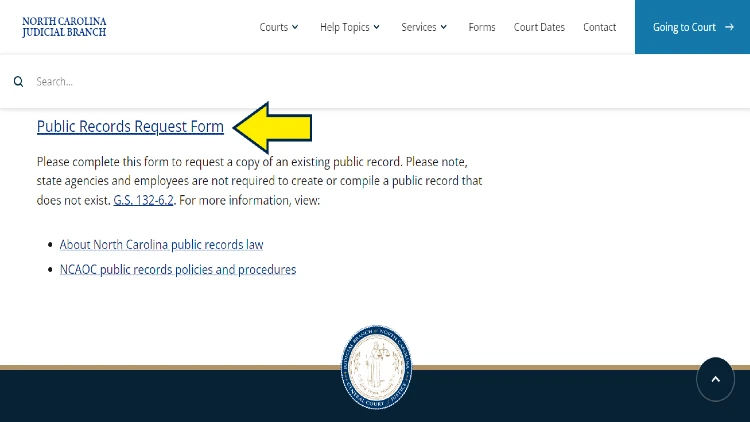
Public records in North Carolina are designed to comply with the Freedom of Information Act, which mandates transparency in government activities, and the forms are available online.
Individuals can start on the North Carolina Judicial branch page regarding records requests.8 The page outlines the various kinds of public records available and provides information and links to the best places to submit a request.
The NCJB also provides a pdf version of the records request form which can be helpful for requesting records at various agencies that do not have electronic records request system.9
North Carolina clerk of court public records should be the first stop for individuals seeking out court records of any kind. Each individual court will have its own court clerk who is in charge of all record-keeping services for that courthouse and will process record requests.
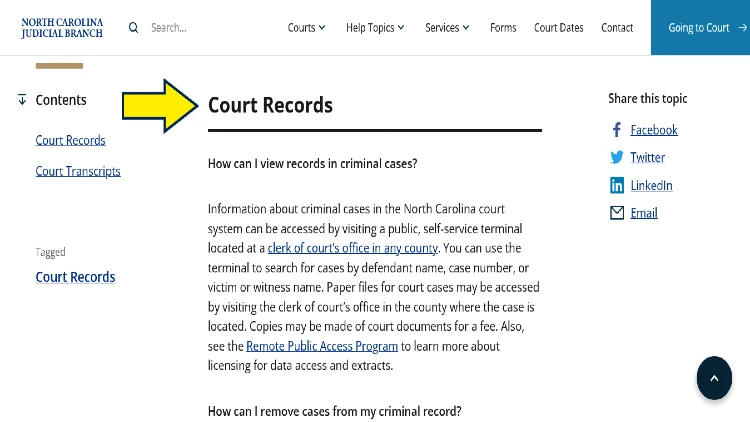
Criminal court records in North Carolina may be accessed by the general public using the online portal.
Individuals can request court records through the website of the North Carolina Judicial branch or by contacting the clerk of court directly.10
Keep in mind that court clerks will only have access to the records of cases that were filed in that specific court and will not have access to the case records for other courts.
Individuals can perform a North Carolina case search by name using the NCJB online records system or by providing the information directly to the court clerk.
Although searches can be completed by name, having information like the case number will help the search go more smoothly.10
The official website of the state of North Carolina has a ton of useful information on how to perform a public record search in the state. Individuals should know there is not a single database for all public records in the state, instead records are kept by individual agencies.
Those interested in finding public records NC property can do so through the website of the secretary of state for North Carolina.11 Individuals can perform their search using the name of the owner or perform searches geographically.
Performing a North Carolina criminal records search is extremely easy and can be done in a few different ways. Individuals who are after a specific record will likely have the best luck going through the court clerk where the case was filed.
However, many people will be looking to get a general criminal history overview for a specific individual, similar to the information that would appear on a background check.
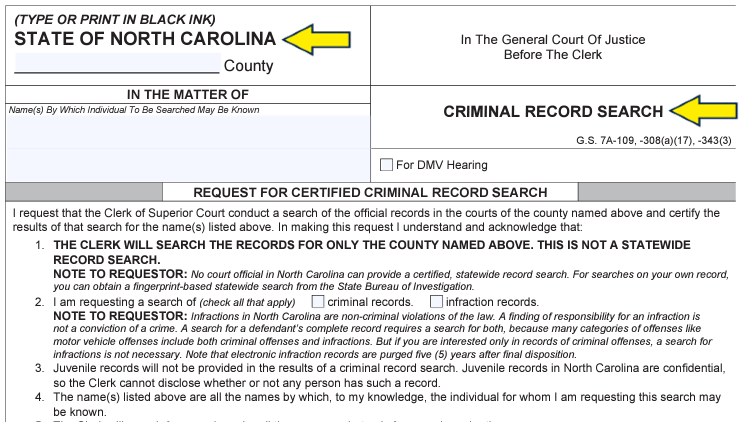
When making a request for an official criminal history check in North Carolina, each county has its own form.
To access an individual’s criminal history information in North Carolina, individuals can fill out the required form to perform a countywide criminal history check on an individual.12
There is also the option to use a private background check service, such as those that are recommended by the state of North Carolina.13
Individuals who still have questions about how to make a North Carolina Public records request can visit the website of the North Carolina Information Technology department.14
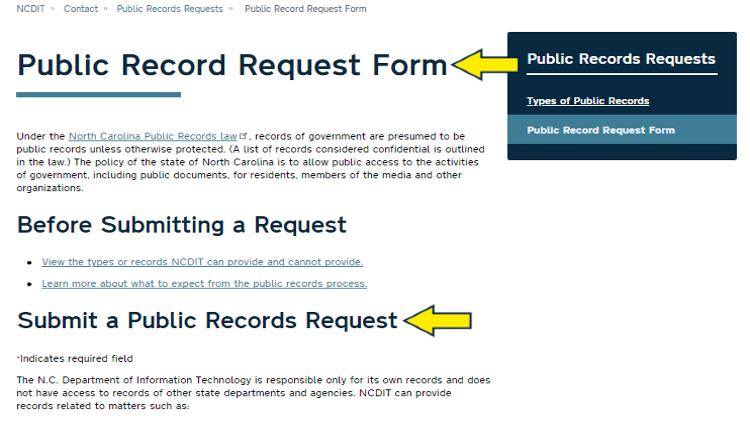
With public records, North Carolina also allows users to search for infractions.
Their website has information on what kind of records can be requested and provides a record request form that can be sent via email to agencies that do not have an online record request system.
When it comes to are restraining orders public record in NC, the answer will come down to the court where the record was filed. Civil court records are generally sealed and will not be public, while criminal records will almost always be available to the public.
Not knowing what to expect from a restraining order can be a dangerous situation to be in. Individuals should research and understand local laws so they can get a better idea of, are restraining orders public record in NC, and other similar questions.
To answer the question, does a harassment order appear on your record? Most harassment orders are filed in civil court and this is unlikely to appear on an individual’s record.
A restraining order is technically public record, however most restraining orders are filed in civil court, whose records are usually sealed. Restraining orders filed in criminal court will always be public record.
Court records searches in North Carolina can be performed for free, however obtaining a copy of the record will usually require a small fee.
North Carolina criminal records can be accessed directly through the court where the records are held or by using the NCJB online court records system.10
Individuals should contact the North Carolina Judicial branch for any questions about their case and the security of their records.
Individuals can request NC court records online through the NC judicial branch website.
The NC public records request law requires all state agencies to make all of their records available to the public unless the records qualify for an exemption.
Individuals can contact the court clerk to search for a case using the name of an individual involved in the case.
All public records in North Carolina will require a small fee to obtain.
Individuals can search for court records by name by visiting the courthouse and speaking with the court clerk.
NC case searches can be performed online via the NCJB online search system or directly through the court clerk.15
North Carolina General Assembly 132-9 is the public records law for the state of North Carolina which outlines which records are considered public and who can access the records.
1U.S. Department of Justice. (2011, March 14). FOIA.gov Home Page. FOIA.gov. Retrieved November 25, 2022, from <https://www.foia.gov/>
2FBI. (2022, October 26). Rap Sheets (Identity History Summary Checks). FBI. Retrieved November 25, 2022, from <https://www.fbi.gov/how-we-can-help-you/need-an-fbi-service-or-more-information/identity-history-summary-checks>
3FTC. (2022, October 27). Fair Credit Reporting Act. Federal Trade Commission. Retrieved November 25, 2022, from <https://www.ftc.gov/legal-library/browse/statutes/fair-credit-reporting-act>
4North Carolina Judicial Branch. (2022). About North Carolina Public Records Law. North Carolina Judicial Branch. Retrieved November 25, 2022, from <https://www.nccourts.gov/services/request-a-public-record/about-north-carolina-public-records-law>
5North Carolina General Assembly. (2022). Chapter 132 – Public Records. North Carolina General Assembly. Retrieved November 25, 2022, from <https://www.ncleg.gov/Laws/GeneralStatuteSections/Chapter132>
6North Carolina Judicial Branch. (2022). NCAOC Public Records Policies and Procedures. North Carolina Judicial Branch. Retrieved November 25, 2022, from <https://www.nccourts.gov/services/request-a-public-record/ncaoc-public-records-policies-and-procedures>
7Bluestein, F., & Lawrence, D. M. (2012, March 27). Public Records in North Carolina. UNC School of Government. Retrieved November 25, 2022, from <https://www.sog.unc.edu/sites/default/files/course_materials/public_records_overview.pdf>
8North Carolina Judicial Branch. (2022). Request a Public Record. North Carolina Judicial Branch. Retrieved November 25, 2022, from <https://www.nccourts.gov/services/request-a-public-record>
9North Carolina Judicial Branch. (2022). Public Records Request. North Carolina Judicial Branch. Retrieved November 25, 2022, from <https://www.nccourts.gov/public-records-request>
10North Carolina Judicial Branch. (2022). Obtaining Court Records. North Carolina Judicial Branch. Retrieved November 25, 2022, from <https://www.nccourts.gov/help-topics/court-records/obtaining-court-records>
11North Carolina Secretary of State. (2022). Land Records. Secretary of State. Retrieved November 25, 2022, from <https://www.sosnc.gov/divisions/land_records>
12North Carolina Judicial Branch. (2019, March 01). Criminal Record Search. North Carolina Judicial Branch. Retrieved November 25, 2022, from <https://www.nccourts.gov/documents/forms/criminal-record-search>
13North Carolina Judicial Branch. (2022, November 22). Criminal Background Check Companies. North Carolina Judicial Branch. Retrieved November 25, 2022, from <https://www.nccourts.gov/documents/publications/criminal-background-check-companies>
14N.C. Department of Information Technology. (2022). Public Records Requests. NCDIT. Retrieved November 25, 2022, from <https://it.nc.gov/contact/public-records-requests>
15North Carolina Judicial Branch. (2022). North Carolina Judicial Branch Home Page. North Carolina Judicial Branch. Retrieved November 25, 2022, from <https://www.nccourts.gov/>
We use cookies to ensure that we give you the best experience on our website. If you continue to use this site we will assume that you are happy with it